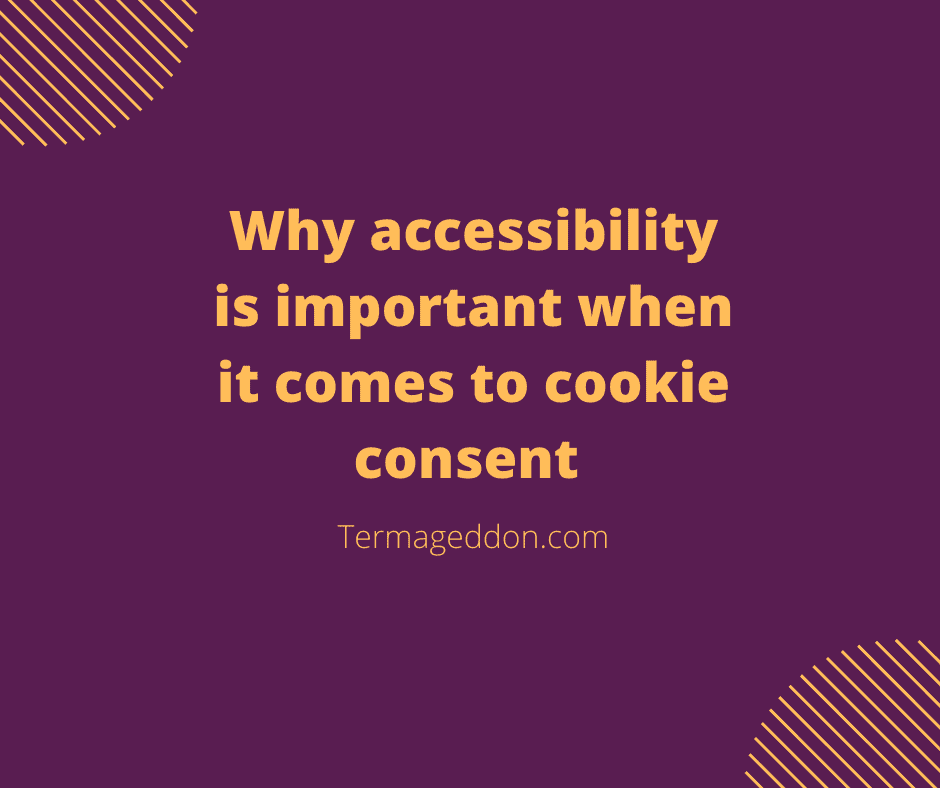End-user consent is the future of the digital economy, there’s no doubt.
The world’s major data privacy laws, like the EU’s General Data Protection Regulation (GDPR), have made it an obligation for anyone who processes personal data to first obtain the explicit consent of the end-users, whose data is being collected.
The digital economy’s largest players, like Alphabet, Meta, and Apple, are all changing their products at core to reflect not only this new legal reality, but also the increasing consumer demand for data protection and choice of data privacy.
All in all, it’s about empowerment of the customer, making the digital economy more user-centric. An often-overlooked part of this movement is web content accessibility.
Accessibility and compliance go hand-in-hand
Making sure that all your end-users, whether on website or app, have an equal and transparent user experience is key to enabling them to make consent choices about the processing of their personal data.
In other words, without web content accessibility on your website, you’re most likely not data privacy compliant. In fact, web content accessibility isn’t just a nice to have, it’s a requirement under California’s CCPA/CPRA.
When it comes to accessibility on websites and in apps, the Web Content Accessibility Guidelines (WCAG) certification is considered the gold standard.
Being WCAG-certified means that the content on a website or in an app is more accessible to a wider range of people with disabilities, and also more accessible to all users in general.
The four principles of WCAG-compliance are:
- Perceivable – users must be able to see the information being presented
- Operable – users must be able to operate the interface
- Understandable – users must be able to understand the information as well as the operation of the user interface
- Robust – users must be able to access the content as technologies advance
WCAG-compliance also applies to the cookie consent solution on your website. If your cookie banner isn’t compliant with WCAG-standards, your website isn’t either.
That’s why having a WCAG-certified cookie consent solution on your website is essential to being compliant with the world’s major data privacy laws like the EU’s GDPR or California’s CCPA/CPRA.
Benefits for end customers: trust and transparency
The vast majority of consumers want improved data privacy and more transparency around how their data is collected and being used, as a recent study by Cisco makes clear.
Building trust with your users through real and honest data protection involves making your website, and its data privacy solutions, compliant with the WCAG-standards, not just compliant with data privacy laws in the user’s region.
In other words, data privacy and accessibility go together.
For example, your website’s cookie consent banner needs to be compliant with both WCAG-standards and California’s CCPA, and there is often a lot of overlap in the requirements, e.g. your cookie consent solution and its visual elements must be clear, readable and similar in size, color and contrast, so as not to be both nudging users toward consent, and inaccessible to users at the same time.
Benefits of using WCAG-certified Usercentrics with Termageddon
Usercentrics is WCAG 2.1 AA-certified, bringing gold standard web accessibility to its consent management technology.
The benefits of using WCAG-certified Usercentrics with Termageddon on your website include:
- Streamline data privacy and accessibility across all your domains,
- Build trustful customer relationships through positive user experiences with compliant and accessible consent solutions,
- Boost opt-in rates with transparent messaging, clear consent choices and inclusive solutions that are accessible to all users, regardless of disabilities,
- Automated cookie scanning technology and consent management from within your dashboard,
- Termageddon’s automatic cookie policy easily combined with Termagoddon’s policy generator for comprehensive data privacy compliance.
Usercentrics provides both a tailored enterprise-level compliance solutions for partners and brands, the self-serve plug-and-play Cookiebot CMP solution for small and medium-size businesses, and a consent solution for apps.
Built around unrivaled scanning technology that can detect and control all cookies and trackers on websites based on the managed consents of their users, Usercentrics offers to automate one of the hardest parts of living up to the California Consumer Privacy Act (CCPA/CPRA), while at the same time providing precise and exhaustive data about websites’ data collection practices – easily implemented into a Privacy Policy for transparency and compliance.
Get unrivaled automatic consent management with gold standard WCAG-certification for your websites and apps with the joint offering from Termageddon and Usercentrics.
Learn more at usercentrics.com or cookiebot.com




